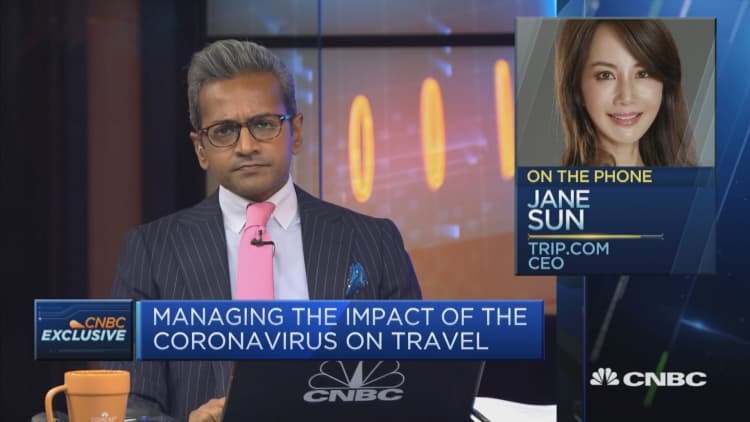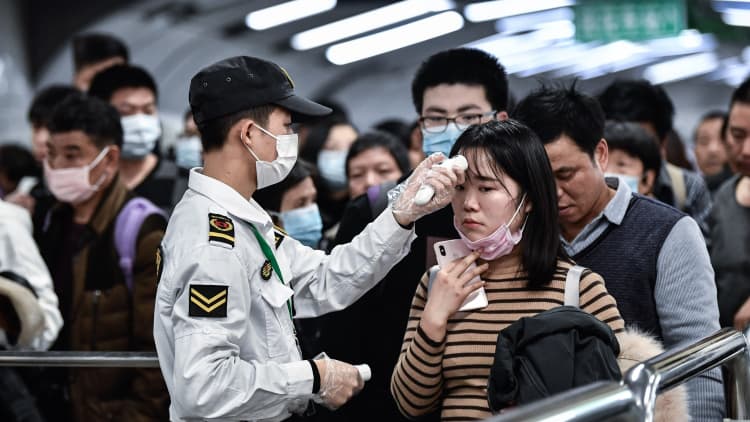
Economies in Asia will have to brace for a tough year ahead as China deals with an outbreak, analysts and officials warned as travel restrictions hit.
China has halted all group tours both domestically and to other countries to contain the spread of a new coronavirus that was thought to have originated from the central Chinese city of Wuhan in Hubei province.
By the end of Monday, there were 4,515 confirmed cases of the coronavirus, China's National Health Commission said in a notice. The death toll was 106.
Coronavirus are a large family of viruses that includes the common cold and SARS, the epidemic which killed almost 800 globally in an outbreak from 2002 to 2003.
The new coronavirus strain called "2019-nCoV" is believed to have an incubation period of two to 14 days, according to the U.S. Centers for Disease Control and Prevention.
Cancellations during peak travel season
Halting group tours from China has sent a wave of cancellations across the travel sector, with booking platforms and travel agents issuing refunds to customers.
Trip.com, China's top online travel booking platform has set up a $200 million disaster relief fund to refund customers who have already paid for travel packages but who now cannot travel due to restrictions, said Jane Sun, the CEO of the company.
It's "not only our company, the whole country will take a hit," said Sun.
But there were already multiple cases of the coronavirus outside of China, ahead of the peak Lunar New Year season which started on Jan. 25.
Countries that have confirmed cases of the new coronavirus include Thailand, Vietnam, South Korea, Singapore, Malaysia, Japan, Australia, France and the United States.
Chinese tourism curbs to hit Asia Pacific economies
The outbreak will hit Asia Pacific economies, particularly in retail, restaurants, conferences, sporting events, tourism and commercial aviation, said Rajiv Biswas, Asia Pacific chief economist at IHS Markit.
"The rapid rise in household incomes in China has triggered a boom in Chinese tourism visits abroad, which have risen from 20 million in 2003 to 150 million in 2018. Consequently the vulnerability of many Asia-Pacific economies to a slowdown in Chinese tourism visits has increased significantly over the past two decades," said Biswas in a note on Tuesday.
"Over the past two decades, the rapid economic growth of China has made it a key export market for many Asia-Pacific nations. However, China's growing importance in Asia-Pacific trade and investment flows has also created considerable vulnerability for the Asia-Pacific region from this type of unpredictable 'black swan' event currently hitting the Chinese economy," said Biswas.

Thailand, Japan and Vietnam are among the economies that will be hit by the new Chinese travel restrictions and sharp near-term slowdown in Chinese tourist visits, Biswas said.
He said Thailand has been one of the "most notable beneficiaries of the boom in Chinese tourism," with total annual Chinese tourist visits rising from 2.7 million in 2012 to 10.5 million in 2019. Chinese tourist spending in Thailand was estimated to have reached $17 billion in 2019.
The Tourism Authority of Thailand is meeting with the private sector on Tuesday to address concerns from an expected slump in business, the Bangkok Post reported.
Japan's services industry is also getting hit by a rash of trip and hotel cancellations, the Nikkei Asian Review reported.
The country is a top vacation spot and IHS' Biswas noted that total Chinese tourist visits to Japan hitting 9.6 million in 2019, accounting for 30% of total foreign tourist visits.
Meanwhile, Chinese tourism arrivals accounted for one-third of international visits to Vietnam, and 15% of total international tourist visits to Australia.
Biswas said governments in Asia Pacific are likely to respond with a range of fiscal and monetary policy stimulus to prop up near-term growth.
Singapore's Trade and Industry Minister Chan Chun Sing said the outbreak is expected to affect the economy of the city-state, Reuters reported. The government is considering support measures like worker levy cuts for impacted sectors like tourism, Chan reportedly said.
Watch the next few weeks
It will be another few weeks before the impact of implemented public health measures can be assessed, due to the incubation period of the virus, said Paul Tambyah, a professor at the NUS Yong Loo Lin School of Medicine.
"In order to stop a virus from spreading, you got to isolate everybody who's sick. You need to find every case, isolate them, make sure they don't spread it to anyone else and then, you can stop the epidemic," Tambyah told CNBC.
Tambyah said there was no need for the general public to avoid travel to anywhere outside of China right now as there has been no evidence of local transmission elsewhere. But, be sensible.
"If you're sitting beside someone who's hacking away, maybe you should move away or put on a mask, or use an extra dose of hand sanitizer. And if you do get sick, then you should see your doctor," said Tambyah.
Trip.com's Sun said she was hopeful that the measures the Chinese government has implemented will help contain the outbreak in weeks and send pent-up demand back up once the virus is under control — just like what it was in 2003.
"When the SARS was under control, we saw double or triple the demand coming back very strongly," said Sun, adding it was the same with Chinese GDP growth.

